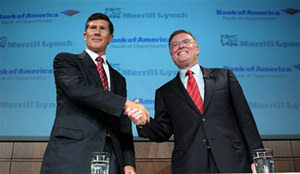‘Say on Pay’ Won’t Prevent Bonus Gluttony
Like many of us, President Barack Obama is outraged by how out of control executive compensation is, but his plan to fix the problem simply won't work.
Like many of us, President Barack Obama is outraged by how out of control executive compensation is. When it comes to bailed-out institutions, he has taken to using strong language, calling bankers “fat cats” and “reckless.” Of course, executive compensation is not a new problem, and many reforms have been instituted in the past to try to deal with it. Obama now says that his new reform, giving shareholders a “say on pay,” will work because it will give shareholders the incentive to “mind the store.” It won’t work.
Shareholders simply do not have the incentive, time or knowledge to mind the store, and say-on-pay won’t change this. Why would a well-diversified shareholder, a person who has spread her savings among a range of corporations (or, more likely, whose 401(k) has done this for her) and who therefore does not own more than a billionth of any single corporation, invest the time and money required in order to learn whether Smith at $150 million is a better CEO hire than Jones at only $125 million? Is she supposed to repeat the exercise for every corporation in her portfolio?
Of course, individuals usually do not own stocks in corporations directly, and this exacerbates the problem. The financial institutions that own corporate stocks are themselves corporations with their own executives, and this means there are two layers of executives getting a cut. It is also folly to expect bank or mutual fund executives to lead a revolt against excessive pay, and naturally they have not.
In 2007, Stan O’Neal received a “retirement package” of $161 million after the institution he led, Merrill Lynch, lost $12 billion in one year. In 2006, Merrill Lynch had voted against any proposal that would have limited severance pay or tied pay to performance in all the corporations that its different mutual funds held. A study of the 29 largest mutual funds in 2006 discovered that Merrill Lynch was not alone. More than three-quarters of the time, these funds voted for management-sponsored proposals regarding executive pay. There were exceptions, such as the fund of the teachers unions, TIAA-CREF, but these constituted a negligible minority.
Say-on-pay is a dog that won’t hunt. The best we can hope for is that it won’t make things worse. Boards of directors all too often fail to serve the interests of their corporations, but at least that is their legal duty. The only duty a shareholder has is to herself, however, and say-on-pay is an invitation for large stakeholders to launch partisan campaigns for executives who will do their bidding at the expense of the rest of the shareholders.
The observation of Christina Romer, head of the White House Council of Economic Advisers, that shareholders do not have an incentive to mind the store is nothing new. Economists Adolf Berle and Gardiner Means pointed this out back in 1932. But unlike Romer, they concluded that nothing could be done about it when ownership was diffused. Seventy-eight years later this remains true.
Let’s remember that as recently as 2002, following the collapse of Enron and WorldCom, Congress passed the Sarbanes-Oxley Act in part because executives were abusing compensation that was being given in the form of options. Let’s also recall that including options in compensation was itself an invention that was supposed to curtail mismanagement, because the change was supposed to align more closely the interests of executives with the interests of shareholders. Bonuses are the new options, and now it is bonuses that must be fixed.
Because of diffused ownership, shareholders remain totally vulnerable to the abuse of excessive executive compensation. It is necessary for the government to get more involved, perhaps by setting a ratio between shareholders’ and executives’ incomes.
There are those who will argue that such laws violate the right of shareholders and executives to enter into contracts freely. But when parties possess vastly disproportionate powers, a contract between them that gives the strong party the lion’s share should not be legal.
In a corporation, executives have all the power and shareholders have none. With or without a say on pay, this situation cannot be changed. What can be changed is the ability of executives to exploit this imbalance, and only a law that limits executive pay will accomplish this.
Moshe Adler teaches economics at Columbia University and at the Harry Van Arsdale Center for Labor Studies at Empire State College. He is the author of the book “Economics for the Rest of Us: Debunking the Science That Makes Life Dismal,” just published by The New Press.
Your support matters…Independent journalism is under threat and overshadowed by heavily funded mainstream media.
You can help level the playing field. Become a member.
Your tax-deductible contribution keeps us digging beneath the headlines to give you thought-provoking, investigative reporting and analysis that unearths what's really happening- without compromise.
Give today to support our courageous, independent journalists.






You need to be a supporter to comment.
There are currently no responses to this article.
Be the first to respond.